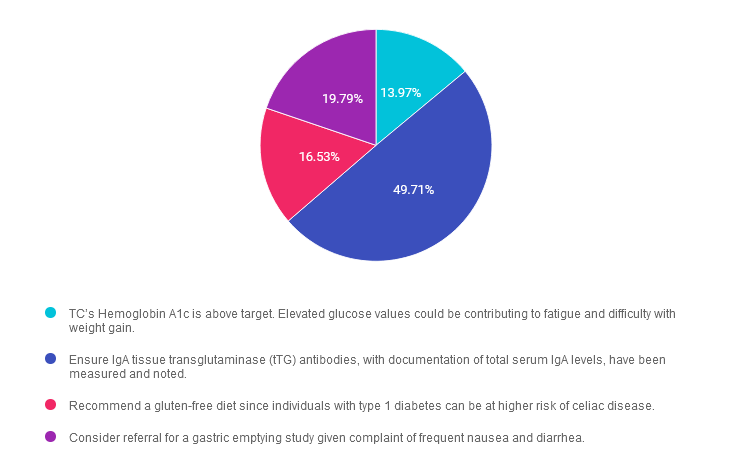For last week’s practice question, we quizzed participants on screening for celiac disease. Almost half of respondents chose the best answer. We want to clarify and share this important information, so you can pass it on to people living with diabetes and your colleagues, plus prepare for exam success!
Before we start though, if you don’t want any spoilers and haven’t tried the question yet, you can answer it below: Answer Question

Question: TC is a 15-year-old who was diagnosed with type 1 diabetes just over a year ago. Following their diagnosis, they quickly transitioned to sensor-augmented pump therapy and are not currently taking any other medications. Recent lab results show normal lipid and renal profiles, a hemoglobin A1c of 7.5%, and a fasting glucose level of 148 mg/dL. Despite following a nutrient-rich diet, TC reports experiencing fatigue, difficulty gaining weight, frequent nausea, and diarrhea.
What Standard of Care recommendation may help explain TC’s reported symptoms?
Answer Choices:
- TC’s Hemoglobin A1c is above target. Elevated glucose values could be contributing to fatigue and difficulty with weight gain.
- Ensure IgA tissue transglutaminase (tTG) antibodies, with documentation of normal total serum IgA levels have been checked.
- Recommend a gluten-free diet since individuals with type 1 diabetes can be at higher risk of celiac disease.
- Consider referral for a gastric emptying study given complaint of frequent nausea and diarrhea.

Getting to the Best Answer
Answer 1 is incorrect. 13.97% chose this answer. “TC’s Hemoglobin A1c is above target. Elevated glucose values could be contributing to fatigue and difficulty with weight gain.” 1. Answer 1 is incorrect, as it is not the best answer. Although the ADA Standards of Care state an A1C of <7% is appropriate for many children and adolescents, we must provide additional assessment for TC’s case. Keep reading below.
Answer 2 is correct. 49.71% of you chose this answer. “Ensure IgA tissue transglutaminase (tTG) antibodies, with documentation of normal total serum IgA levels have been checked.” 2. Answer 2 is correct. Screening for celiac disease is recommended in individuals with type 1 diabetes soon after diagnosis or when symptoms occur, such as those reported by TC. It is recommended that IgA tissue transglutaminase (tTG) antibodies be checked, with documentation of normal total serum IgA levels, or IgG tTG and deamidated gliadin antibodies if IgA is deficient.
Answer 3 is incorrect. About 16.53% of respondents chose this. “Recommend a gluten-free diet since individuals with type 1 diabetes can be at higher risk of celiac disease.” 3. Although a gluten-free diet is recommended if TC is diagnosed with celiac disease, it is essential to complete appropriate screening before implementation of a gluten-free diet.
Finally, Answer 4 is incorrect. 19.79% chose this answer. “Consider referral for a gastric emptying study given complaint of frequent nausea and diarrhea.” 4. Although we can see an increased risk of gastroparesis in diabetes, determined by a gastric emptying study, gastroparesis typically develops as a long-term complication of diabetes. Initial recommendations would be to rule out other causes and ensure recommended screening and treatment.
We hope you appreciate this week’s rationale! Thank you so much for taking the time to answer our Question of the Week and participate in this fun learning activity!
FREE Webinar:
The Impact of Adverse Childhood Experiences on Health
Join us October 29th, 2024 at 11:30 am

Adverse childhood experiences (ACE) are associated with an increased risk of diabetes, heart disease, cancer & a variety of other health consequences for adults. This session reviews how diabetes care & education specialists can provide screening, assessment, & trauma-informed care to individuals who experienced ACEs & are living with toxic stress. We will explore strategies to address ACES & improve outcomes for individuals & communities. Throughout, we will focus on supporting self-care with a focus on recognizing & promoting resilience.
Topics include:
- Discuss the benefits of assessing Adverse Childhood Experiences (ACE) in individuals with diabetes.
- State the relationship between ACE Scores & the risk of future health complications.
- Describe a person-centered approach to fostering resilience & self-care for individuals with toxic stress.
- Identify two strategies to provide trauma-informed care in your work setting.
Intended Audience: These courses are knowledge-based activities designed for individual or groups of diabetes educators, including RNs, RDs, Pharmacists, Nurse Practitioners, Clinical Nurse Specialists, Physician Assistants and other health care providers interested in enhancing their knowledge of management of inpatient hyperglycemia.
Instructor: Beverly Thomassian RN, MPH, CDCES, BC-ADM is a working educator and a nationally recognized diabetes expert.
Two registration options:
- Enroll for FREE (No CEs): Click here to enroll.
- Earn 0.5 CEs – Fee: $19.00 – Click here to enroll in the course.
Enroll in our entire Level 4 | Advanced & Specialty Topic Courses
Sign up for Diabetes Blog Bytes – we post weekly Blog Bytes that are informative and FREE! Every week we post one exam practice Question of the Week and Rationale of the Week. Sign up below!
Accreditation: Diabetes Education Services is an approved provider by the California Board of Registered Nursing, Provider 12640, and our CPEU courses have received Prior Approval* from the Commission of Dietetic Registration (CDR), Provider DI002. Since our CPEU courses received Prior approval* from the CDR, these CPEU courses satisfy the CE requirements for the CDCES /BC-ADM regardless of your profession!
The use of DES products does not guarantee the successful passage of the certification exam. CBDCE and ADCES do not endorse any preparatory or review materials for the CDCES or BC-ADM exams, except for those published by CBDCE & ADCES.









